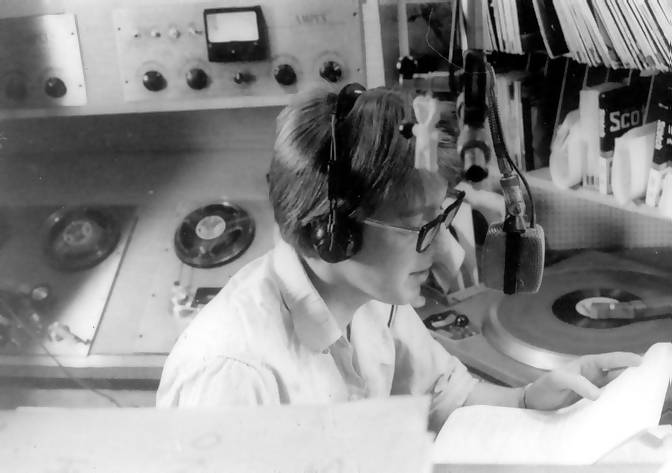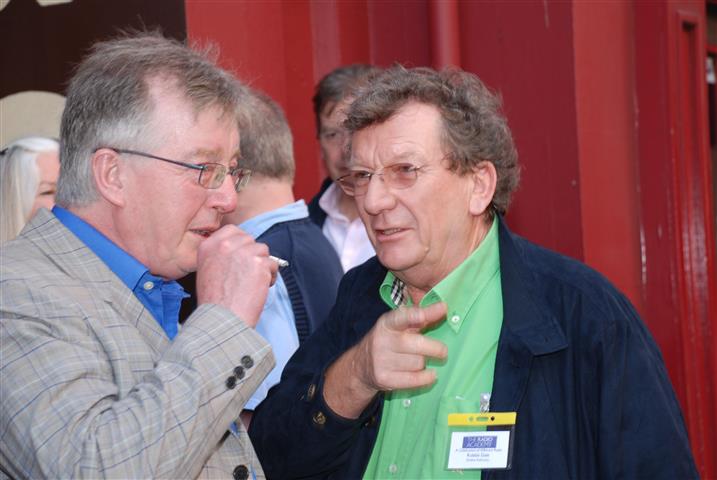Ray Clark has interviewed a number of the people involved with Radio Caroline. Extracts from these conversations were used in his book Radio Caroline: The True Story Of The Boat That Rocked
(reviewed here).
We are very grateful to Ray for allowing us to publish some of his interviews on The Pirate Radio Hall of Fame.
This one is with Mike Ahern, one of the most popular disc-jockeys on both Radio Caroline North and South. Sadly Mike died in October 2009. There is a tribute to him here.
MIKE AHERN: How did I start? Well I actually wrote to them, to Caroline House in London, and they wrote back and said “we get 4000 letters a week” (laughs) and, you know, they were getting an amazing
amount of mail so I wrote back and said “you may be getting 4000 letters a week but I'm the best disc-jockey in the north of England...” I'd done a little bit, to be honest, but not a great deal. So they said “if
you're so good, you'd better come down to (Caroline House in) Chesterfield Gardens and do an audition”. So I came down to Chesterfield Gardens and did the audition, and I didn't hear anything for two or three weeks. I called
them up and they said “we're glad you've called. Can you start next week?” and that was virtually how I started.
Basically, when I did the audition, I just sounded like the people I'd been listening to on Radio Caroline North. I just copied it so it was, I think, probably just luck more than anything else.
RAY CLARK: What do you think was the magic of Radio Caroline North?
MA: I think probably because it was brand new and because it was music. People weren't hearing the music they wanted to hear on the BBC. Also there was this very informal style of presentation. You have to bear in mind that
for years the BBC had been perceived as very upper class with terribly well-spoken announcers and the suddenly you had people coming along like me who went (exaggerated Liverpool accent) “This is Radio Caroline North on 199
metres” and everyone could identify with that because that's what people spoke like. And I think that, coupled with the magic of the music - where they could hear The Last
Time by the Rolling Stones and they could hear The Beatles, which they weren't hearing on the BBC. That was I think the magic of it - and also the romance of being at sea: the idea of these guys on a ship.
|

|
|
Mike in the Radio Caroline South studio. Photo taken and kindly provided by Carl Thomson.
|
RC: You were on the north ship to start with and then the south ship. How did the two compare?
MA: Well obviously the south ship was a bigger market because when we came down to Essex, to Frinton, we were all very excited because it meant we were getting into London and into Essex. The north ship was probably a better ship -
in terms of that it was a bigger ship and you had much more room on it. The Mi Amigo, which was the original Caroline,[1] she was very low in the water and she used to wallow around something dreadful. It
was like a roll to the side and a pitch forward. Some of the times I thought “she's going to go, she's going to go” but she never did. You could literally step from the tender onto the Mi Amigo whereas on the north
ship you had to climb up a rope ladder and, in rough weather, I tell you what... It's OK when you're 23 or 24 but you certainly wouldn't want to do it now.
RC: Going back to the ship, with the Mi Amigo, when you were doing a programme and it was blowing a hooley outside, it must have been horrific. Did you still rely on live programmes or did you have storm tapes
or whatever?
MA: Well basically, if it was blowing a gale, we had these Gates turntables which were very, very big turntables and the arms were weighted. The arms were so heavy that I don't think our discs lasted very long because they used to
gouge into the disc but, if it got really bad, yes, we put standby tapes on but generally we got away with playing the music off vinyl, even in the worst storms. It was quite remarkable but if the records jumped you would say
“sorry about that. There's a force 7 gale out here today” and people would go “oh, OK” so it was really good in that regard.
|

|
|
Mike, left, and Caroline South colleague Robbie Dale outside the Radio Academy's 2007 Celebration of Offshore Radio at Sugar Reef in London. Photo by Martin van der Ven.
|
RC: Were you paid on the ship so there was no tax?
MA: Yes. It was.... well, I thought it was exceptionally good pay for its time and because we were paid through a foreign company - as far as I understand it - tax was paid there, which was at a lower rate than UK tax so we were
probably slightly better off in terms of tax. I think it was Liechtenstein or Andorra or some place in Europe but I really don't know the financial details. All I do know is that the money went into my account every week so that
was fine. I didn't really go into the financial side of it.
I think the funniest... well, there were a whole stack of funny things but there was one time with Mark Sloane - he was a newsreader on Radio Caroline South. We got hungry one night and decided we wanted
a bacon sandwich. They used to lock the refrigerator for some inexplicable reason so I went down to the chef and I got the keys. I came upstairs and I opened the fridge and I was cooking the bacon. Mark and I were standing in the
galley doing it and this Captain - he was a real Nazi. He really was the pits. He came down and said (exaggerated German accent) “Vat are you doing in the galley?” and I said “we're making a bacon sandwich,
Captain.” He said “Mr Ahern you will immediately put the bacon away and you will not have any bacon sandwiches. You will eat when everyone else eats” and I said “come on, it's a bacon sandwich.
Get outta here. This is not the Royal Navy.” He said “Mr Ahern, you will leave the ship immediately” and he called out the tender from Harwich. He actually ordered me off the ship so I sailed back to Harwich and I
called Ronan O'Rahilly who was the (station) owner and said “Ronan, I've been sent off the ship”. He said (Irish accent) “Oh holy mother of God Michael, what have you done now?” and I
said “well it was nothing. I was making a bacon sandwich”. He said “What?!” I said “I was making a bacon sandwich and the Captain didn't like it. He threw me off the ship”. So he says “I'll be
down there.” So Ronan arrived an hour and a half later. He gets on the tender and we both go back to the ship - and this is now the middle of the night. We get alongside the Mi Amigo and all the searchlights come on. Ronan says
“get on board” and the Captain says (German accent) “if he comes on the ship, I am leaving”. So Ronan says “he's coming on. You can leave.” So they are having this stand-up fight and I have one foot
on the Mi Amigo and one foot on the tender. In the end the Captain left the ship and we were Captain-less for a little while. I mean it was all over a bacon sandwich but basically the guy was the kind of guy - he was used to giving
orders and we weren't the kind of people who took orders. We weren't seamen, we were broadcasters. So I look back and, when I see Mark Sloane from time to time, he often says to me “Mr Ahern, you will leave the ship
immediately!”
NOTES
|
|
This is incorrect. The mv Mi Amigo was the Radio Atlanta ship before it became Radio Caroline South.
|
Back to the interview with Ian Ross.
Conversation with Graham Webb over the page.
Our thanks to Ray Clark.
|

